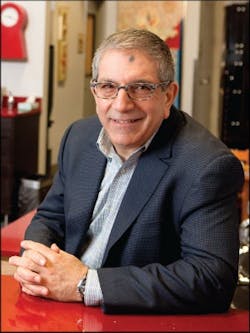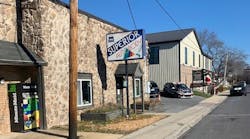As a military police officer and a multiple launch rocket system repairer in Iraq and Afghanistan, Jeremiah Kuehl’s most crucial asset was his vehicle.
“Because our vehicles were our main tool that we used every day, performing good preventative maintenance checks on the vehicles and diagnosing problems before they became a problem was important,” he says.
Service King North Pasadena
Location: North Pasadena, Calif.
Size: 23,700 square feet
Staff: 20+
Average Monthly Car Count: 160
From helping his stepfather in race pits as a teenager to his 13-year U.S. Army stint to his 4.0 GPA achieved studying collision repair and refinish technology at Universal Technical Institute in Houston, Kuehl’s passion for cars has permeated his life—and now it’s extended into his role as a service advisor intern for Service King North Pasadena.
After suffering an injury and being discharged from the Army, Kuehl was hired through Service King’s Mission 2 Hire program—an initiative to hire at least 500 U.S. Armed Forces veterans, their spouses or active duty personnel by 2020. And as he nears the end of his six-month internship, he’s putting the final touches on combining his technical background with his customer service training to become a better service advisor.
I normally show up around 6:45 a.m. I’ll print out all the reports for everyone for our morning production meeting. That way, when they get here, everything is good and ready. They don’t have to do anything. They just get here, sit down at the meeting and everyone will go through the day’s workload.
At the production meeting, I sit down and listen. That’s a learning opportunity for me. The other service advisors will talk about their vehicles and say, “We’ve got a problem with this,” and I’ll listen and find out what their solution is to it. I’ll write it down in my notepad, which I have on me throughout the day. That way, in the future, if I ever have that problem, I know what the answer is or who to ask; we don’t have to go through that process again and again. Paying attention in the production meeting definitely helps me improve my skills, as well as my time management and the overall production of the shop.
After that, I go check on the cars and make sure they’re where they’re supposed to be. And then once the body techs get here, I get with them, let them know what vehicles I have, where they’re at, where they expect to go for the day. If it’s in body, I’ll ask, “Do you think we can get it into paint today?” If there’s a lot of work, we’ll leave it in body for the day. “But let’s work on it so we can get it in paint tomorrow and get it pushed out.”
Prioritizing everything is what goes on the rest of the day. Normally between 9 and 11 a.m. is when I make my calls to the customers. That’s normally the time they want to be called. I like to contact a customer at least every other day. To keep track of the clients I have to call, I use our production tool, ACCUCenter. I have everything in there, all my reminders: “In 15 minutes, you have to call this person.” I make sure that I’m not doing anything or that I’ll be out in a work stall writing an estimate while it’s time for me to give them a call. I’ll plan everything according to that.
Throughout the day, you’ll have your normal drop-offs that come in, and you pretty much have to stop what you’re doing for a second to go check in a vehicle. If someone wants an estimate done, I’ll be the first to jump up and walk up front to write one up because I’m new at this and I need the practice. Everyone else has been doing this for a while and they don’t mind me running up and writing up an estimate. It’s practice for me and that’s the way I take it. Anything I can do to help me and the shop out by writing more estimates and becoming more familiar with it, I’ll do it.
I’ve been on both sides now: I was a body tech helper for one year, and now I’m a service advisor. The biggest thing I’ve learned about being a service advisor is the customer contact. It’s about creating the smiles on the customers’ faces and taking the stress away. They just got in an accident and they’re already stressed. I make it easier on them by keeping that every-other-day contact with them. After we give their vehicle back to them, I have a follow-up phone call and put a personality to Service King. Other shops say, “Here’s your car back,” and never call you again.
Sometimes it’s a little bit difficult to hold back the technical talk with customers. But you try to phrase it as simply as possible for them, like explaining the difference between putting an aftermarket part on a car to an OEM part. Some customers don’t understand and you have to explain it to them. When they see their vehicle at the end, they think, “Wow, it’s not aftermarket, it’s OEM.” No, actually it’s aftermarket. It just looks like OEM. You have to steer around all the technical terms and weave through the cones just to help them understand.
It’s easier for me with the technicians. They all know I used to be a body technician. So when they say this panel is damaged, they know I’m going to get it because I was one of them before and I can look at it and follow along. Some of the people who are new to the service advisor internship have never been around a car before, so they may need it broken down a little more. They may need a little more time. Having that background definitely helped out. It speeds up a lot of the processes.
Service King really prepared me for writing estimates. I had two weeks of training, and they had this role-playing system that acted as a stress test. They put you in front of a computer, have you read these papers and fill out an estimate, and then you get a phone call from a role-playing customer complaining about the estimate. Then you have customers walking in and you’ve got to balance everything. It’s a stress test, just to see how you deal with handling customers and the way you interact with them. Are you getting angry with them? Or are you nice and calm the entire time? It’s a great way to pick out who will thrive as an intern.
As a military police officer, I dealt with a tremendous amount of stressful situations with soldiers, with spouses, being in foreign lands, dealing with somebody who doesn’t know how to speak your language, or you don’t know how to understand them. Just simply the way you stand, the way you talk, your demeanor and your tone and your voice is all important. It definitely helped me now with being a service advisor.
We have those customers who are very picky about their cars. No matter how many times you tell them you’re going to take great care of their car, they’re still going to be very cautious. That’s where the customer contact comes into play. That’s why you call them every other day at a certain time—whatever time is good for them. You have to keep your word. If you say you’re going to call at 9, and you call at 9:30, you’re not keeping your word. So if you say you’re going to call them at 9, call them at 9—that way, they have that feeling that their car is actually being taken care of.
Before I go home, I’ll print out my report and all the vehicles I have and where they’re at. While the techs are here, I’ll go and check in on the vehicles one last time before I leave. I want to know where the cars are going to be by the time they leave for the day. They’ll give me an honest estimate: “We’ll be finished with body work.” And if we have all the parts in, I’ll say, “Alright, so for tomorrow, I’m going to put it on the paint list.”
That way, when I come in the next morning, I’m not so rushed and judging on my own if the body work is done or not. When I come in in the morning, I know where everything is at. It’s a lot easier and lot less stressful.



